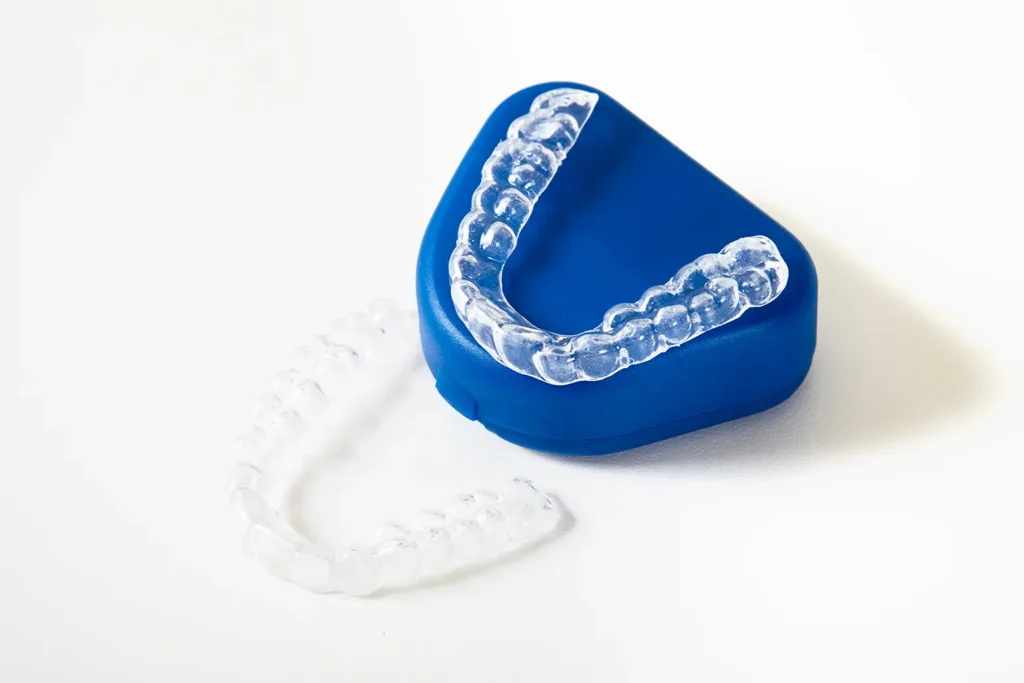Table of Contents
Anxiety is a common mental health condition that affects millions of people worldwide. While it’s widely recognized for its impact on mental and emotional well-being, its effects on physical health, particularly oral health, are often overlooked. This article will explore how anxiety affects our teeth, provide insights into why this happens, and offer practical steps to mitigate these effects and maintain optimal oral health. By understanding the connection between anxiety and oral health, you can take proactive steps to protect your teeth and gums.
Can Stress Affect My Teeth?
The simple answer is yes. Anxiety and stress can have a profound impact on your oral health in various ways. The physical manifestations of anxiety often translate into habits or conditions that can damage your teeth and gums over time.
1. Teeth Grinding (Bruxism)
- Cause: One of the most common ways anxiety affects teeth is through bruxism, or teeth grinding. When stressed or anxious, people often clench or grind their teeth, especially at night. This unconscious habit can wear down tooth enamel, leading to increased sensitivity, tooth fractures, and even jaw pain.
- Impact: Over time, bruxism can cause significant damage to the teeth, including flattened or chipped teeth, worn enamel, and in severe cases, tooth loss. It can also contribute to temporomandibular joint (TMJ) disorders, which cause pain in the jaw and difficulty in chewing.
2. Dry Mouth (Xerostomia)
- Cause: Anxiety can also lead to dry mouth, a condition where the mouth doesn’t produce enough saliva. Stress triggers the body’s fight-or-flight response, which can inhibit saliva production. Certain medications used to treat anxiety can also contribute to dry mouth.
- Impact: Saliva plays a crucial role in maintaining oral health by washing away food particles and neutralizing acids produced by bacteria. A lack of saliva increases the risk of tooth decay, gum disease, and oral infections.
3. Neglect of Oral Hygiene
- Cause: Individuals struggling with anxiety may neglect their daily oral hygiene routine due to a lack of motivation or focus. Anxiety can also lead to a feeling of being overwhelmed, making it difficult to maintain consistent self-care habits, including brushing and flossing.
- Impact: Poor oral hygiene practices can quickly lead to a buildup of plaque, which causes cavities, gum disease, and bad breath. Over time, neglecting oral care can result in more severe dental issues that require extensive treatment.
4. Stress-Related Dietary Choices
- Cause: Anxiety and stress often lead to poor dietary choices, such as consuming sugary snacks or comfort foods that are high in carbohydrates. Stress eating is a common coping mechanism, but it can have detrimental effects on oral health.
- Impact: Sugary and acidic foods contribute to tooth decay by providing fuel for harmful bacteria in the mouth. Frequent consumption of these foods without proper oral care increases the likelihood of developing cavities and gum disease.
5. Canker Sores and Gum Inflammation
- Cause: Anxiety and stress are known to contribute to the development of canker sores and gum inflammation. Stress weakens the immune system, making the body more susceptible to infections and inflammation in the mouth.
- Impact: Canker sores are small, painful ulcers that can make eating and speaking uncomfortable. Gum inflammation, or gingivitis, can progress to more severe gum disease if not addressed, leading to tooth loss.
Why Anxiety Affects Our Teeth
Understanding the underlying reasons why anxiety affects our teeth is essential for addressing and mitigating its impact. Anxiety triggers various physiological and behavioral responses that directly affect oral health.
Fight-or-Flight Response
- Explanation: When experiencing anxiety, the body enters a state of heightened alertness known as the fight-or-flight response. This response prepares the body to deal with perceived threats by increasing heart rate, constricting blood vessels, and releasing stress hormones like cortisol.
- Impact on Oral Health: The fight-or-flight response diverts resources away from non-essential functions, including saliva production, leading to dry mouth. It also causes muscle tension, which can result in teeth grinding and jaw clenching.
Behavioral Responses
- Explanation: Anxiety often leads to behavioral changes, such as neglecting self-care routines or adopting unhealthy coping mechanisms. These behaviors, while intended to reduce stress, can inadvertently harm oral health.
- Impact on Oral Health: Skipping regular brushing and flossing, consuming sugary foods, and using tobacco or alcohol as coping mechanisms can all contribute to oral health problems. The longer these behaviors persist, the more significant the impact on teeth and gums.
Immune System Suppression
- Explanation: Chronic anxiety can suppress the immune system, making the body more vulnerable to infections and inflammation. The body’s ability to fight off bacteria in the mouth is compromised, leading to an increased risk of oral health issues.
- Impact on Oral Health: A weakened immune system allows harmful bacteria to thrive in the mouth, increasing the risk of gum disease, tooth decay, and oral infections like canker sores.

How to Mitigate the Effects of Anxiety on Oral Health
While anxiety can have a significant impact on oral health, there are several strategies you can employ to mitigate these effects and protect your teeth and gums. By incorporating these practices into your daily routine, you can maintain good oral health even in the face of anxiety.
Practice Stress Management Techniques
- Relaxation Techniques: Incorporate stress management techniques into your daily routine to help reduce anxiety. Practices such as deep breathing exercises, meditation, and yoga can help calm the mind and reduce the physical tension that contributes to teeth grinding and jaw clenching.
- Regular Exercise: Physical activity is a powerful stress reliever. Regular exercise helps reduce anxiety by releasing endorphins, the body’s natural mood elevators. Aim for at least 30 minutes of moderate exercise most days of the week.
Address Teeth Grinding
- Night Guards: If you grind your teeth at night, consider using a custom-fitted night guard. This dental appliance protects your teeth from the damaging effects of grinding and can reduce jaw pain associated with bruxism.
- Jaw Exercises: Practice exercises that relax the jaw muscles, such as gently massaging the jaw area or performing stretches that relieve tension. Your dentist can provide specific recommendations tailored to your needs.
Maintain a Consistent Oral Hygiene Routine
- Daily Care: Regardless of how anxious or stressed you feel, maintaining a consistent oral hygiene routine is crucial. Brush your teeth at least twice a day with fluoride toothpaste and floss daily to remove plaque and prevent decay.
- Set Reminders: If anxiety makes it difficult to remember to brush and floss, set reminders on your phone or place sticky notes in visible locations to prompt you to complete your oral care routine.
Stay Hydrated and Avoid Sugary Foods
- Hydration: Drink plenty of water throughout the day to combat dry mouth and promote saliva production. Water also helps rinse away food particles and bacteria, reducing the risk of tooth decay.
- Healthy Diet: Make mindful dietary choices, even when stressed. Opt for fruits, vegetables, whole grains, and lean proteins that support oral health. Limit your intake of sugary and acidic foods that can harm your teeth.
Visit Your Dentist Regularly
- Routine Check-Ups: Regular dental visits are essential for monitoring your oral health and addressing any issues early. Inform your dentist about your anxiety so they can provide tailored care and recommend specific treatments, such as fluoride applications or dental sealants, to protect your teeth.
- Discuss Concerns: If anxiety is affecting your oral health, discuss your concerns with your dentist. They can offer guidance on managing bruxism, dry mouth, and other anxiety-related issues.
Seek Professional Help for Anxiety
- Mental Health Support: If anxiety is significantly impacting your quality of life, consider seeking professional help. A mental health professional can provide therapy, counseling, or medication to help manage anxiety and reduce its impact on your overall health, including your oral health.
- Mindfulness Practices: Incorporate mindfulness practices into your daily routine to help manage anxiety. Mindfulness involves focusing on the present moment and can help reduce stress and prevent the physical manifestations of anxiety that affect oral health.

Steps to Maintain Oral Health Despite Anxiety
Maintaining oral health is crucial, especially when dealing with anxiety. By following these steps, you can protect your teeth and gums while managing the effects of anxiety.
1. Create a Relaxing Oral Care Routine
- Set the Mood: Make your oral care routine a calming ritual. Play soft music, use aromatherapy, or practice deep breathing while brushing and flossing to create a relaxing environment that reduces stress.
2. Use Fluoride Products
- Strengthen Enamel: Use fluoride toothpaste and mouthwash to strengthen tooth enamel and protect against decay, especially if you experience dry mouth due to anxiety.
3. Address Dry Mouth
- Saliva Substitutes: If dry mouth is a persistent issue, consider using saliva substitutes or sugar-free gum to stimulate saliva production and keep your mouth moist.
4. Practice Good Posture
- Jaw Position: Maintain good posture to reduce tension in the jaw muscles. Avoid clenching your teeth or resting your chin on your hand, which can contribute to jaw pain and bruxism.
5. Manage Dietary Triggers
- Healthy Choices: Be mindful of foods and drinks that can trigger anxiety or stress. Caffeine, for example, can increase anxiety in some individuals. Opt for herbal teas or water instead.
Conclusion
Anxiety can have a profound impact on your oral health, but with the right strategies, you can mitigate its effects and maintain a healthy smile. By understanding how anxiety affects your teeth, practicing stress management techniques, and maintaining a consistent oral hygiene routine, you can protect your teeth and gums from the damaging effects of anxiety. Remember, maintaining your oral health is an essential part of your overall well-being, and taking proactive steps to manage anxiety can help safeguard both your mental and dental health.
At Montana Center for Implants and Dentures, we understand the challenges that anxiety can bring to your oral care routine. Dr. Josh Muir and Dr. Tanner Townsend are here to support you with personalized care and advice to help you manage the impact of anxiety on your oral health. Whether you need guidance on preventing teeth grinding, addressing dry mouth, or maintaining a consistent oral hygiene routine, we are committed to helping you achieve and maintain a healthy, confident smile. Don’t let anxiety compromise your oral health—take control today with the right care and support.





